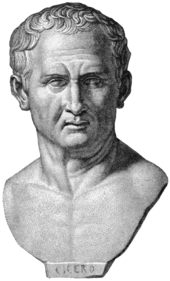Natural law is a system of law based on a close observation of human nature, and based on values intrinsic to human nature that can be deduced and applied independently of positive law. According to the theory of law called jusnaturalism, all people have inherent rights, conferred not by act of legislation but by "God, nature, or reason." Natural law theory can also refer to "theories of ethics, theories of politics, theories of civil law, and theories of religious morality."
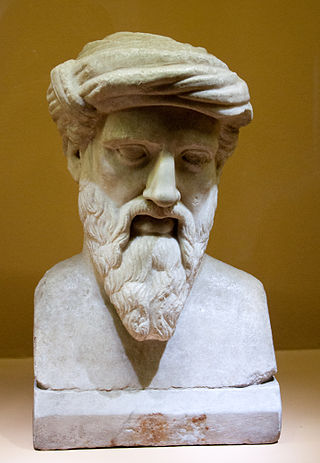
Pythagoras of Samos was an ancient Ionian Greek philosopher, polymath and the eponymous founder of Pythagoreanism. His political and religious teachings were well known in Magna Graecia and influenced the philosophies of Plato, Aristotle, and, through them, the West in general. Knowledge of his life is clouded by legend, but he appears to have been the son of Mnesarchus, a gem-engraver on the island of Samos or the city of Tyre. Modern scholars disagree regarding Pythagoras's education and influences, but they do agree that, around 530 BC, he travelled to Croton in southern Italy, where he founded a school in which initiates were sworn to secrecy and lived a communal, ascetic lifestyle. This lifestyle entailed a number of dietary prohibitions, traditionally said to have included vegetarianism, although modern scholars doubt that he ever advocated complete vegetarianism; he was said to have advised athletes to "feast on flesh" exclusively.
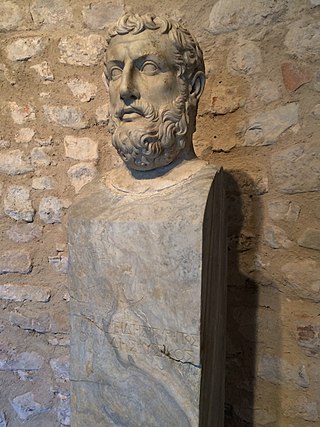
Parmenides of Elea was a pre-Socratic Greek philosopher from Elea in Magna Graecia.

Jeremy Bentham was an English philosopher, jurist, and social reformer regarded as the founder of modern utilitarianism.
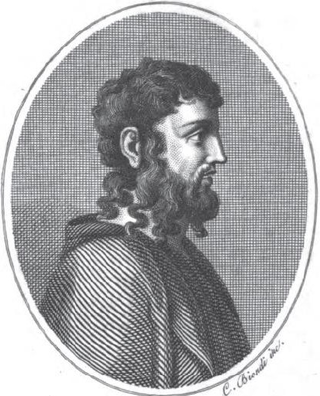
Dicaearchus of Messana, also written Dikaiarchos, was a Greek philosopher, geographer and author. Dicaearchus was a student of Aristotle in the Lyceum. Very little of his work remains extant. He wrote on geography and the history of Greece, of which his most important work was his Life of Greece. Although modern scholars often consider him a pioneer in the field of cartography, this is based on a misinterpretation of a reference in Cicero to Dicaearchus' tabulae, which does not refer to any maps made by Dicaearchus but is a pun on account books and refers to Dicaearchus' Descent into the Sanctuary of Trophonius. He also wrote books on ancient Greek poets, philosophy and politics.

Xenocrates of Chalcedon was a Greek philosopher, mathematician, and leader (scholarch) of the Platonic Academy from 339/8 to 314/3 BC. His teachings followed those of Plato, which he attempted to define more closely, often with mathematical elements. He distinguished three forms of being: the sensible, the intelligible, and a third compounded of the two, to which correspond respectively, sense, intellect and opinion. He considered unity and duality to be gods which rule the universe, and the soul a self-moving number. God pervades all things, and there are daemonical powers, intermediate between the divine and the mortal, which consist in conditions of the soul. He held that mathematical objects and the Platonic Ideas are identical, unlike Plato who distinguished them. In ethics, he taught that virtue produces happiness, but external goods can minister to it and enable it to effect its purpose.

Pythagoreanism originated in the 6th century BC, based on and around the teachings and beliefs held by Pythagoras and his followers, the Pythagoreans. Pythagoras established the first Pythagorean community in the ancient Greek colony of Kroton, in modern Calabria (Italy). Early Pythagorean communities spread throughout Magna Graecia.

E pluribus unum – Latin for "Out of many, one" – is a traditional motto of the United States, appearing on the Great Seal along with Annuit cœptis and Novus ordo seclorum which appear on the reverse of the Great Seal; its inclusion on the seal was approved in an act of the U.S. Congress in 1782. The first word of E pluribus unum is actually an abbreviation of the Latin preposition ex, meaning “out of.” While its status as national motto was for many years unofficial, E pluribus unum was still considered the de facto motto of the United States from its early history. Eventually, the U.S. Congress passed an act in 1956, adopting "In God We Trust" as the official motto.
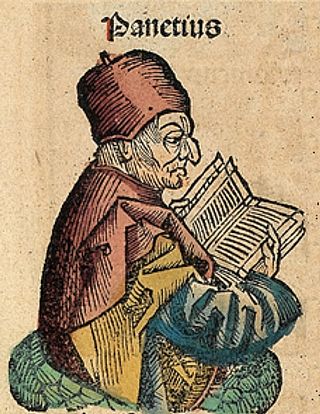
Panaetius of Rhodes was an ancient Greek Stoic philosopher. He was a pupil of Diogenes of Babylon and Antipater of Tarsus in Athens, before moving to Rome where he did much to introduce Stoic doctrines to the city, thanks to the patronage of Scipio Aemilianus. After the death of Scipio in 129 BC, he returned to the Stoic school in Athens, and was its last undisputed scholarch. With Panaetius, Stoicism became much more eclectic. His most famous work was his On Duties, the principal source used by Cicero in his own work of the same name.
Harper & Row v. Nation Enterprises, 471 U.S. 539 (1985), was a United States Supreme Court decision in which public interest in learning about a historical figure's impressions of a historic event was held not to be sufficient to show fair use of material otherwise protected by copyright. Defendant, The Nation, had summarized and quoted substantially from A Time to Heal, President Gerald Ford's forthcoming memoir of his decision to pardon former president Richard Nixon. When Harper & Row, who held the rights to A Time to Heal, brought suit, The Nation asserted that its use of the book was protected under the doctrine of fair use, because of the great public interest in a historical figure's account of a historic incident. The Court rejected this argument holding that the right of first publication was important enough to find in favor of Harper.
Inter arma enim silent lēgēs is a Latin phrase that literally means "For among arms, the laws are silent" but is more popularly rendered as "In times of war, the law falls silent."

Alcmaeon of Croton was an early Greek medical writer and philosopher-scientist. He has been described as one of the most eminent natural philosophers and medical theorists of antiquity and he has also been referred to as "a thinker of considerable originality and one of the greatest philosophers, naturalists, and neuroscientists of all time." His work in biology has been described as remarkable, and his originality made him likely a pioneer. Because of difficulties dating Alcmaeon's birth, his importance has been neglected.
This page is a list of topics in ancient philosophy.
Theodorus the Atheist, of Cyrene, was a Greek philosopher of the Cyrenaic school. He lived in both Greece and Alexandria, before ending his days in his native city of Cyrene. As a Cyrenaic philosopher, he taught that the goal of life was to obtain joy and avoid grief, and that the former resulted from knowledge, and the latter from ignorance. However, his principal claim to fame was his alleged atheism. He was usually designated by ancient writers ho atheos, "the atheist."
Tax protesters in the United States advance a number of constitutional arguments asserting that the imposition, assessment and collection of the federal income tax violates the United States Constitution. These kinds of arguments, though related to, are distinguished from statutory and administrative arguments, which presuppose the constitutionality of the income tax, as well as from general conspiracy arguments, which are based upon the proposition that the three branches of the federal government are involved together in a deliberate, on-going campaign of deception for the purpose of defrauding individuals or entities of their wealth or profits. Although constitutional challenges to U.S. tax laws are frequently directed towards the validity and effect of the Sixteenth Amendment, assertions that the income tax violates various other provisions of the Constitution have been made as well.
Amicus Plato, sed magis amica veritas is a Latin phrase, translating to "Plato is my friend, but truth is a better friend ." The maxim is often attributed to Aristotle, as a paraphrase of the Nicomachean Ethics 1096a11–15.

Philosophical theism is the belief that the Supreme Being exists independent of the teaching or revelation of any particular religion. It represents belief in God entirely without doctrine, except for that which can be discerned by reason and the contemplation of natural laws. Some philosophical theists are persuaded of God's existence by philosophical arguments, while others consider themselves to have a religious faith that need not be, or could not be, supported by rational argument.
The philosophy of human rights attempts to examine the underlying basis of the concept of human rights and critically looks at its content and justification. Several theoretical approaches have been advanced to explain how and why the concept of human rights developed.
Blonder-Tongue Labs., Inc. v. University of Ill. Foundation, 402 U.S. 313 (1971), is a decision of the United States Supreme Court holding that a final judgment in an infringement suit against a first defendant that a patent is invalid bars the patentee from relitigating the same patent against other defendants. In so ruling, the Supreme Court overruled its 1936 decision in Triplett v. Lowell, which had required mutuality of estoppel to bar such preclusion, and held that the better view was to prevent relitigating if the plaintiff had had a full and fair opportunity to litigate the issue in question.
